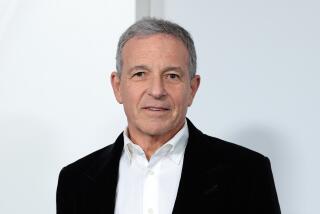On TV, Eisner and Ovitz Made a Show of Unity
- Share via
GEORGETOWN, Del. — Walt Disney World was anything but the Happiest Place on Earth when Michael Eisner and Michael Ovitz visited the Florida theme park for its 25th anniversary in September 1996.
The media was buzzing with reports that Eisner’s hiring of Ovitz as Walt Disney Co.’s president a year earlier had turned out to be a disaster. So Eisner, Disney’s chief executive, arranged for a joint appearance on CNN’s “Larry King Live.”
“It’s just all baloney,” Eisner insisted when asked by King about the rumors of trouble at the top. Eisner said it was all just “typical competitive Hollywood gossip.”
King then asked: “So, Michael Eisner, would you hire Michael Ovitz again today?”
“Yes,” Eisner quickly responded. “The answer is yes. The answer is yes.”
On Thursday, after an excerpt of the King interview was shown in Delaware Chancery Court, Eisner conceded the obvious: He had not been upfront with a national television audience. On the very day that he appeared on CNN, Eisner testified, he had told Disney directors that his problems with Ovitz were so dire that he was trying to trade him to rival Sony Pictures Entertainment.
In retrospect, Eisner said, it was a mistake to go ahead with the interview, in which he admitted he wasn’t “completely candid.”
“It was unfortunate, it was stupid and I wish we hadn’t done it, but we did.”
Thursday was Eisner’s fourth day on the witness stand. He, Ovitz and current and former Disney directors are being sued by shareholders over the severance package paid to Ovitz when he was fired in December 1996 after 15 months as president.
Lawyers for the shareholders have been boring in on the CEO’s statements to cast doubt on his version of events. Eisner has insisted that he fully involved Disney directors in the hiring and firing of Ovitz and that the company legally had no choice but to pay the former top talent agent a stock-and-cash severance package that plaintiffs value at $140 million.
This week other public statements made about Ovitz came back to haunt Eisner, including a news release that wrongly characterized Ovitz’s departure from Disney as a “mutual decision.”
Eisner’s admission that he wasn’t candid about his relationship with Ovitz shed light on the lengths to which Disney went to shield from view the meltdown taking place at Burbank’s Team Disney headquarters in 1996. It also provided a window onto a Hollywood culture in which fudging the truth, about one’s age or about how much it costs to film a movie, appears to be routine and accepted.
The revelations also raised questions among some experts about whether a regulatory line had been crossed. “If what he said was untrue at the time he said it, and it was material and some shareholders relied on that to buy or sell shares, that’s problematic under securities law,” said Charles Elson, a professor of corporate governance at the University of Delaware.
In his testimony Thursday, Eisner attempted to justify his answers to King’s questions by contending that rumors of a rift were hurting the company. Ovitz’s fate had yet to be settled, Eisner said, and shareholders were best served by the two men presenting a united front.
“Michael Ovitz and I both were trying to make it look like we were getting along,” he testified. “I was trying to keep 110,000 people comfortable with the company.... It’s a traditional fine line in politics or in business as to how much to reveal to the public before you have actually concluded your decision-making process so as to be clean and clear.”
Concerns about the trade he wanted to make with Sony were also on Eisner’s mind during the King interview, he testified. Persuading Sony to hire Ovitz as a ranking entertainment executive would have solved Eisner’s headache, not to mention saved Disney severance costs.
“The last thing I needed was to have a Larry King fiasco,” Eisner testified, “and the next day fly to New York and meet with Nobuyuki Idei,” chairman of Sony Corp.
Eisner said he feared that if he and Ovitz didn’t do the interview, Sony might get wind of the reports about a rift between them and never even consider hiring Ovitz.
“I was also trying to convince Sony,” Eisner said, that Ovitz was “the greatest human being.”
Whether viewers bought the performance is unclear. Hollywood certainly didn’t. Instead, rumors and news accounts about an inevitable split only increased until Ovitz’s firing three months later, as battles raged out of view of the CNN cameras.
Sometimes the quarrels were over the smallest of issues. In one instance, Eisner announced that Father Leo O’Donovan, then president of Georgetown University, would join Disney’s board. Ovitz, Eisner testified, was miffed because his name wasn’t on the news release.
“The crisis was brewing,’’ Eisner said. “We were having a September hurricane, an emotional hurricane.”
At one point Thursday, Steven Schulman, a lawyer for the shareholders, asked Eisner to reconcile comments he made about being present at a board committee meeting during a discussion about Ovitz’s compensation when minutes of the meeting say he showed up after that discussion ended.
“I thought I was there,” Eisner said. “Maybe I left for a few minutes and came back.”
More to Read
The biggest entertainment stories
Get our big stories about Hollywood, film, television, music, arts, culture and more right in your inbox as soon as they publish.
You may occasionally receive promotional content from the Los Angeles Times.











